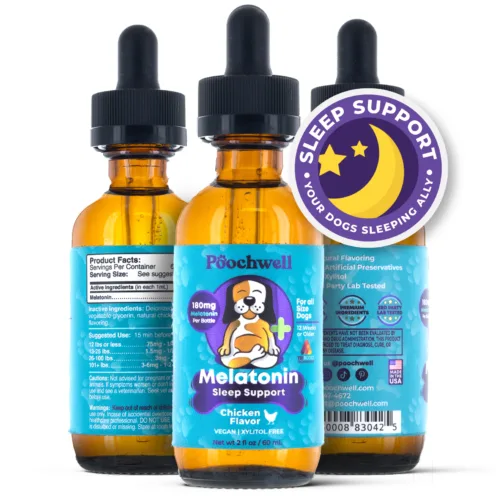Understanding Melatonin for Dogs: A Comprehensive Overview
What is Melatonin?
Melatonin is a naturally occurring hormone produced by the pineal gland, a small gland in the brain. This hormone plays a pivotal role in regulating the sleep-wake cycle, commonly known as the circadian rhythm. In both humans and dogs, melatonin levels typically rise in response to darkness, signaling the body that it is time to wind down and prepare for sleep.
Melatonin Production in Dogs
- Endogenous Production: Dogs naturally produce melatonin as a response to changes in light and darkness. When exposed to darkness, the pineal gland increases melatonin production, inducing a sense of sleepiness.
- External Sources: While dogs can produce melatonin on their own, there are situations where introducing melatonin supplements becomes beneficial. This is especially relevant in cases where dogs experience disruptions in their natural melatonin production, such as irregular sleep patterns or environmental stressors.
Benefits of Melatonin for Dogs
1. Improved Sleep Quality*
- Facilitates Restful Sleep: Melatonin supplementation can contribute to a more restful sleep for dogs, particularly those with sleep disturbances or irregular sleep patterns.
2. Anxiety and Stress Reduction*
- Natural Calming Agent: Melatonin acts as a natural calming agent, making it useful for dogs dealing with separation anxiety, noise phobias, or other stressful situations.
3. Treatment of Alopecia*
- Managing Hair Loss: Melatonin has demonstrated effectiveness in managing certain cases of alopecia (hair loss) in dogs, offering a potential solution for dermatological issues.
4. Cognitive Function Support*
- Benefits for Senior Dogs: Melatonin may provide support for cognitive function in senior dogs, potentially contributing to improved mental well-being.
Safe Usage Guidelines
1. Consultation with a Veterinarian
- Professional Guidance: Before incorporating melatonin into your dog’s routine, it is essential to consult with a veterinarian. They can assess your dog’s specific health needs and provide personalized recommendations.
2. Proper Dosage
- Individualized Approach: The appropriate dosage of melatonin can vary based on factors such as the dog’s size, breed, and overall health condition.
- Here is Poochwell recommended approach to dosing melatonin to dogs
Dogs weighing less than 12lbs: 1/4 Dropper – 0.75mg of Melatonin
Dogs weighing 13-25lbs: 1/2 Dropper – 1.5mg of Melatonin
Dogs weighing 26-100lbs: 1 Dropper – 3mg of Melatonin
Dogs weighing 101+lbs: 1-2 Droppers – 3-6mg of Melatonin
3. Monitoring for Side Effects
- Vigilance is Key: While melatonin is generally considered safe, it’s crucial to monitor your dog for any potential side effects, such as lethargy or digestive issues. If unexpected symptoms arise, discontinue use and consult your veterinarian promptly.
Conclusion
In conclusion, understanding melatonin and its potential benefits for dogs empowers pet owners to make informed decisions about their furry friends’ well-being. Whether addressing sleep issues*, anxiety*, or dermatological* concerns, melatonin can be a valuable supplement when used responsibly and under veterinary guidance. Remember, your veterinarian is the best resource for tailoring melatonin usage to your dog’s individual needs, ensuring a happy and healthy life for your beloved companion.
*The content provided on this website is for informational purposes only and is not intended as a substitute for professional advice. These statements have not been evaluated by the Food and Drug Administration. These product is not intended to diagnose, treat, cure, or prevent any disease.

